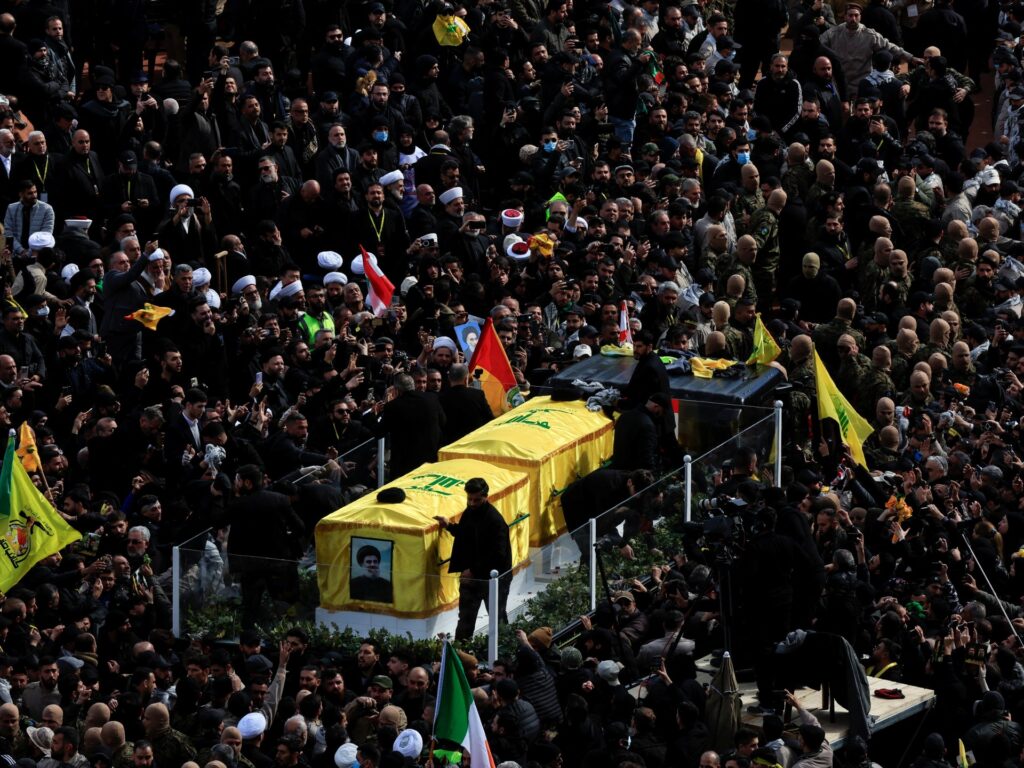Tens of thousands of people in Lebanon are paying their last respects to Hezbollah’s late leader Hassan Nasrallah, who was killed in an Israeli attack in the southern suburbs of the capital, Beirut, last September.
The public funeral, delayed for security reasons, began at 1pm local time (11:00 GMT) on Sunday at Beirut’s Camille Chamoun Sports City Stadium, which has a capacity of about 50,000 people.
The event kicked off with a speech by Iran’s Supreme Leader Ayatollah Ali Khamenei that was read out at the funeral.
Then, the decorated coffins of Nasrallah and his heir apparent Hashem Safieddine – killed in another Israeli air attack a week later were slowly driven into the stadium. Both coffins were draped with yellow clothes – the colour of the Iran-backed group.
At the sight of the coffins, the crowd erupted in cheers and then followed the journey into the stadium in silence.
In a televised speech, Hezbollah leader Naim Qassem said the group would keep following the path of Nasrallah.
“We will uphold trust and walk on this path, we will uphold your will,” Qassem said referring to Nasrallah, adding: “You are still with us: your… path and struggle live within us” and “I am loyal to the legacy Nasrallah”.

Hezbollah organisers had installed thousands of extra seats on the stadium’s pitch and many more outside, where mourners were able to follow the ceremony on a giant screen. Giant portraits of Nasrallah were plastered on walls and bridges across south Beirut.
Reporting from the site of the funeral procession, Al Jazeera correspondent Zeina Khodr said Nasrallah was like a “father figure” for Lebanon’s Shia community, among whom Hezbollah has a “significant following”.
“Nasrallah was not just a leader for them, he was a father figure, a man who protected them, because this is a community in Lebanon that has long felt marginalised,” she said.
“What they are trying to say is we are still strong, we still have political strength,” Khodr said, referring to the mourners.

Hezbollah official Ali Daamoush told reporters on Saturday that about 800 personalities from 65 countries will attend the funeral in addition to thousands of individuals and activists who came from around the world.
“Come from every home, village and city so that we tell the enemy that this resistance will stay and is ready in the field,” Daamoush said, referring to Israel.
Nasrallah, the face of Hezbollah for more than three decades, and Safieddine had temporarily been buried in secret locations over fears their funerals could be targeted by Israeli forces.
Nasrallah will be buried in a piece of land near the airport road in Beirut’s southern suburbs. Safieddine will be laid to rest in his hometown of Deir Qanoun en-Nahr in southern Lebanon.
Meanwhile, the Lebanese state media reported that Israeli planes flew at low altitude over Beirut during the funeral ceremony.
“The hostile warplanes flew at low altitude over the skies of Beirut and its suburbs,” the National News Agency said, hours after it reported Israeli air attacks in the area between Qleileh and Sammaaiyah in south Lebanon’s Tyre district.
The Israeli military said it targeted rocket launchers in southern Lebanon which it said threatened its civilians.
“A short while ago, the IDF [Israeli military] conducted a precise intelligence-based strike on a military site containing rocket launchers and weapons in Lebanese territory, in which Hezbollah activity was identified,” a military statement said.
“Additionally, several rocket launchers that posed an imminent threat to Israeli civilians were struck in southern Lebanon.”
A fragile ceasefire has been in place in Lebanon since November 27, ending months of cross-border warfare between Israel and Hezbollah that escalated into a full-scale conflict in September.
Under the ceasefire deal, Israel was supposed to fully withdraw from southern Lebanon by January 26, but the deadline was extended to February 18 after Israel refused to comply.
The Israeli army withdrew from southern Lebanese towns on Tuesday, but maintains a military presence at five border outposts.


